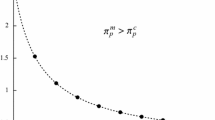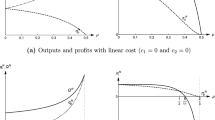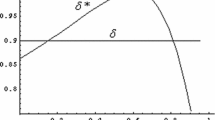Conclusions
This paper has explored the possibilities for profitable collusion in rent-seeking games. Anticipated collusion is only profitable for coalitions that approach the size of the grand coalition, while unanticipated collusion is always profitable. By reducing the rent-seeking expenditures of the colluding firms, collusion bestows an external benefit on non-colluding firms. Economies of scale in rent-seeking increase the profitability of collusion, while diseconomies of scale reduce the attractiveness of collusion. When 1 of 3 firms enjoys an incumbency advantage, the total gains from collusion fall as the incumbency advantage rises. Furthermore, 2-firm collusion is more profitable to the colluding coalition when the incumbent colludes with a non-incumbent than when the two non-incumbents collude, whether or not the collusion is anticipated. In all circumstances, unanticipated collusion is more profitable to the colluding coalition than perfectly anticipated collusion. Colluding firms may therefore have an incentive to conceal their collusive activity, even when collusion is legal.
Similar content being viewed by others
References
Chang, M. and Harrington, J.E., Jr. (1988). The effects of irreversible investment in durable capacity on the incentive for horizontal merger. Southern Economic Journal 55(2): 443–453.
Graham, D.A. and Marshall, R.C. (1987). Collusive bidder behavior at single object second price and English auctions. Journal of Political Economy 95(6): 1217–1239.
Harrington, J.E., Jr. (1984). Noncooperative behavior by a cartel as an entry-deterring signal. RAND Journal of Economics 15(3): 426–433.
Rogerson, W.P. (1982). The social costs of monopoly and regulation: A game-theoretic analysis. Bell Journal of Economics 13(2): 391–401.
Stigler, G.J. (1950). Monopoly and oligopoly by merger. American Economic Review 40(2): 23–24.
Stubbing, R.A. (1986). The defense game. New York: Harper and Row.
Tullock, G. (1980). Efficient rent-seeking. In J.M. Buchanan, P.D. Tollison, and G. Tullock (Eds.), Toward a theory of the rent-seeking society, 97–112. College Station: Texas A&M University Press.
Author information
Authors and Affiliations
Additional information
We would like to thank Joseph E. Harrington, Jr., for helpful comments. All errors remain the responsibility of the authors.
Rights and permissions
About this article
Cite this article
Alexeev, M., Leitzel, J. Collusion and rent-seeking. Public Choice 69, 241–252 (1991). https://doi.org/10.1007/BF00123862
Received:
Accepted:
Issue Date:
DOI: https://doi.org/10.1007/BF00123862




